How do you follow up arguably the
most popular situation comedy of the last decade?
Ray Romano faced that dilemma
just a couple of years ago when his classic sitcom Everybody
Loves Raymond went out on top. Not sure of what he wanted to do
next, he started meeting up with his former Raymond co-writer
Mike Royce to bat around ideas.
What they came up with was close
to home – to say the least – a funny and yet dramatic look at the
lives, loves and disappointments of men in their late 40s. The idea
grew into Men of a Certain Age, which is just about to start
its second season on the TNT Network.
To play his character’s best
friends, Romano turned to two actors who were no strangers to iconic
television themselves. Andre Braugher is best known for playing Det.
Frank Pembleton on the classic 90s crime drama Homicide: Life on
the Street, but he had also played lead characters in the series
Gideon’s Crossing and Hack. Scott Bakula also has had
his share of series success – particularly playing Sam Beckett on
Quantum Leap. He
has also had starring roles on Star Trek: Enterprise, Mr. & Mrs.
Smith and more recently Chuck.
A few weeks before the return of
Men of a Certain Age, we were lucky enough to be one of the
few websites invited to sit in on conference calls with all three stars
of the series.
I love your show. It's really
great.
Ray Romano:
Thank you.
My favorite shows, yours and
Dexter.
Ray Romano:
Oh, nice. Yes, well they're the same. The same theme, really,
underneath it all.
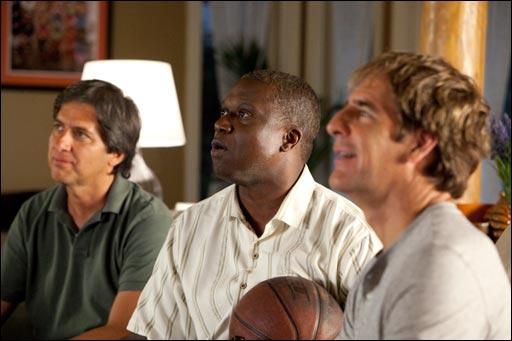 Yes, it's a great show. I was
wondering what you gave you the idea to come up with the show.
Yes, it's a great show. I was
wondering what you gave you the idea to come up with the show.
Ray Romano:
Well the idea - I didn't come up with the idea. By that I mean I was
kind of living the idea. Myself and Mike Royce were both coming off
of the show [Everybody Loves] Raymond, and about four months
after it ended we had lunch together. We knew we wanted to do
something together. We just [were] talking: what did we want write
about? What do we know how to write about? We both were going
through the same thing – this identify search. Here we are, late
40s, just finished a successful thing but what's next? What does it
mean? Existentially we were kind of flipping around. You get to that
age and you wonder are you going to be passionate again? Is anything
going drive you? Or did you do everything you wanted? So that's kind
of where we were, all at different levels. We said, "Let's just
write about that."
How much can you relate to Owen?
Andre Braugher:
I relate to everything. I’m a father and a son and a coworker, you
know what I mean, and a pal. There’s nothing here that’s not true
for me too. I don’t have Owen’s health problems but just in terms of
having a sharp strong-willed wife – I’ve got one of those. And the
rambunctious, three rambunctious boys, I’ve got those. I’ve got the
whole stew of relationships in terms of father, coworker, pal,
husband. I’ve got it all.
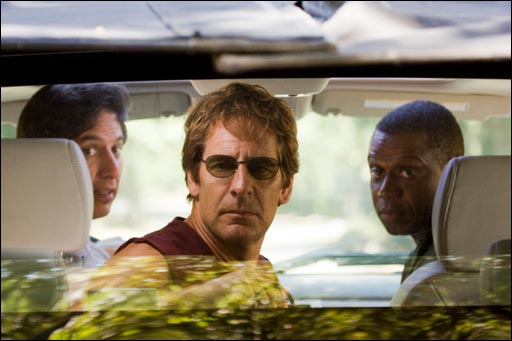 You didn’t have to do a heck of a
lot of research then?
You didn’t have to do a heck of a
lot of research then?
Andre Braugher:
No not really, because this is right up my alley. The hardest part
of the job really is being honest about what these situations are
and not shying away from the uncomfortableness of them, you know
what I mean? They are uncomfortable and I think we do our best
service when we acknowledge them and deal with these uncomfortable
moments. I think that’s one of the things that people like about the
show is that we don’t have a wise crack that’s an act out and didn’t
shy away from the uncomfortableness of being who we are.
Andre said
that his character was very much like him, he can relate to him 100%
almost. Can you relate to your character a lot? I mean is it a lot
of him in you?
Scott Bakula:
There is hardly any of me in him. That is what was so attractive
when I read the part. Obviously, I can relate to the actor side of
him and I can relate to some of his actor's frustrations certainly.
But what has been most appealing for me is that he is so different
from me. What most actors like to do is escape into a character. For
me to play this guy who has no responsibility and no relationship
and no kids and no mortgage and sleeps with all kinds of women –
different ages, sizes, colors – it's really a blast for me to do.
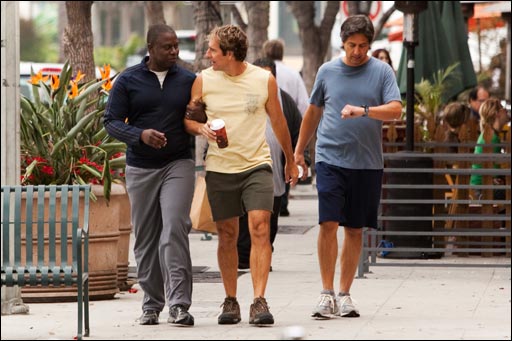 All three of you guys sort of
played iconic TV roles previously. How involved were you in the
casting of Andre and Scott? And when did you know that you had the
right mix – that people aren't going to be thinking about
Raymond or Homicide
or Quantum Leap, they'll be thinking about you guys as normal
guys in their 40s just getting together?
All three of you guys sort of
played iconic TV roles previously. How involved were you in the
casting of Andre and Scott? And when did you know that you had the
right mix – that people aren't going to be thinking about
Raymond or Homicide
or Quantum Leap, they'll be thinking about you guys as normal
guys in their 40s just getting together?
Ray Romano:
I was involved in every step of the way in casting – myself and Mike
Royce. I think the biggest thing for me was casting Andre as this
character because he never entered our mind. We pictured kind of a
beaten down, frumpy middle-aged man who's underneath his father's
shadow, and he's a little bit unsure of himself. Somebody pitched
Andre to us. At first we didn't want to meet him – because we
thought of Homicide, and we thought this guy commands this
presence and he walks in a room and he's sure of himself. So we met
him, and he was so game to play this – and not that this mattered,
but he wasn't physically the same way he was on Homicide.
Middle age had caught up to him a little bit in that aspect - in
that respect. But he had never done comedy and not that we're a
comedy, but there's comedy in the show. He was open to do it. We
just thought, "Geez, he's such a great actor, let's just go with the
best actor." That was the one, the chemistry that I was worried
about. And I thought it was there immediately. Like in the pilot
when we're in the car and I'm talking losing two pounds of pee –
losing two pounds by peeing last night – and the way he responds to
me. All my worries went away. I just thought this guy is this
character, yeah.
And Scott was just great right
off the bat. Scott had this naturalness to him. So he came in and
read. He was another guy who [we] really didn't really think of,
then when he came in and read we saw that yeah, he had this natural
flow with this character.
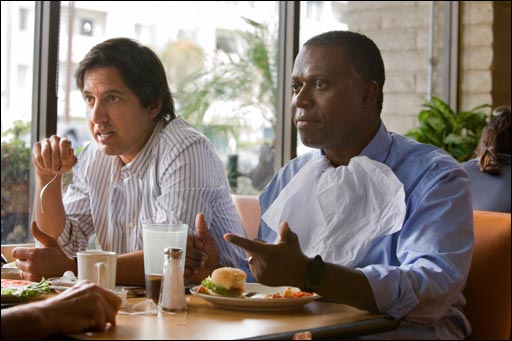 Once you got
together with the guys how quickly did you feel that you were really
meshing and were able to get into these characters without the
baggage of your former parts?
Once you got
together with the guys how quickly did you feel that you were really
meshing and were able to get into these characters without the
baggage of your former parts?
Andre Braugher:
I don’t feel as though I carried over any baggage from my former
parts and I will say that beginning with the first read through as
well as the first rehearsal we were all really concentrated and
focused on really telling the story to the best of our ability. The
beauty of this story resides in the fact that all of these guys are
really fumbling their way through their lives and that they are not
blessed with competence in every arena. Some are married, some are
not, some are successful, some are not. We meshed pretty quickly
because I think we all realize the tone of this show is the
ridiculousness of the struggle but also its poignancy. We’re all in
our own way in the same place. We’re struggling for that happiness
and that satisfaction in life. We want to do a good job. We want to
honor these relationships and in its own way it’s all of us looking
for our own happiness – but of course it’s elusive, it’s an elusive
goal.
Tell me about
the overall theme of the season in your mind? What do you see as
each guy's challenge this year?
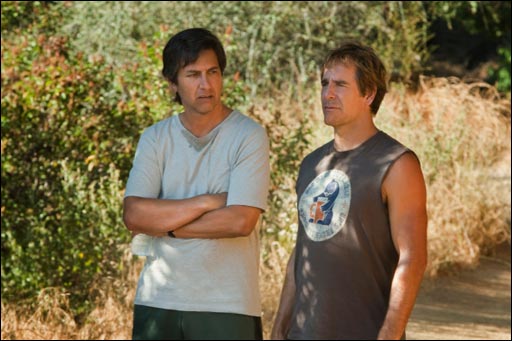 Scott Bakula:
Well, certainly, Terry's challenge is life challenges – which is
when is he going to grow up and kind of get on with life? With his
real job trying to sell cars for his friend in the car dealership,
he is pressed into that. Also he gets involved in a more serious
kind of adult relationship this year on the show and there are
challenges there. Joe's character is wrestling with being single,
continues to wrestle with some gambling issues and his peculiar
friendship that he has with Manfro, his bookie. Andre's challenges
are beyond just trying to live and balance a wife and three kids.
The reality of that and he is now saddled with running this
dealership and still having his dad looking over his shoulders and
running a dealership in a time when not everybody is out there
buying cars. So everybody has again some kind of very real issues,
none of them earth shattering but all of them relevant and
relatable.
Scott Bakula:
Well, certainly, Terry's challenge is life challenges – which is
when is he going to grow up and kind of get on with life? With his
real job trying to sell cars for his friend in the car dealership,
he is pressed into that. Also he gets involved in a more serious
kind of adult relationship this year on the show and there are
challenges there. Joe's character is wrestling with being single,
continues to wrestle with some gambling issues and his peculiar
friendship that he has with Manfro, his bookie. Andre's challenges
are beyond just trying to live and balance a wife and three kids.
The reality of that and he is now saddled with running this
dealership and still having his dad looking over his shoulders and
running a dealership in a time when not everybody is out there
buying cars. So everybody has again some kind of very real issues,
none of them earth shattering but all of them relevant and
relatable.
What appeals to you about playing
your role?
Andre Braugher:
About playing Owen? Well when I read the pilot script back in I
guess the spring of 2008, I was just impressed by the struggle of
one man to find validation, in his work and among his family. What
was appealing to me was that this character was not an authority
figure and that he was immersed in this rich stew of relationships –
with being a husband and a father and a son and a pal and a coworker
and a boss. All of these different relationships seemed to be
fascinating because not often do we get a chance to see men in this
demographic in their natural element. Quite often – and I’ve played
many of these roles – they’re authority figures or they’re
functionaries or something to that effect. I felt as though Owen was
a special kind of guy and more appealing because he wasn’t exactly
sharp or competent. The struggle appealed to me.
Ray Romano:
Well, I mean it's a drama for one thing. It's challenging to not
have to resort to the old comedic crutches that I did. Not crutches,
but just the go-to comedic kind of way that you do a sitcom and the
way you deliver lines. What's good about this is trying to get rid
of all that and do it real. Are you there? I heard a click.
Yes, yes.
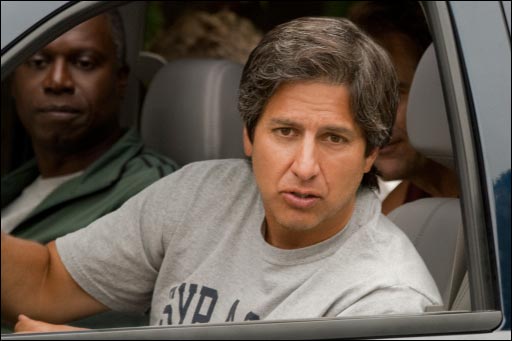 Ray Romano:
Okay. Sometimes people just hang up in the middle of me when I'm
answering. But anyway, yes, even when we do comedic scenes it's a
challenge. I spent nine years on Raymond, which I loved doing
and I'm proud of. But the genre is what it is in that's it's real,
but it's a little bit pseudo-real. It's kind of a little bit broader
than real life, a little bit tweaked. When I do this show I want to
make sure I don't go there. I want this character to be real and
organic and still be funny and still be dramatic. That’s kind of
challenging. I mean I'm finding it fun to do and also to be subtle.
Because you know how you're doing film and you don't need to be big.
When you do a sitcom - it's like a play. You have to play out to the
people. In this, people come into you, if that makes any sense.
Ray Romano:
Okay. Sometimes people just hang up in the middle of me when I'm
answering. But anyway, yes, even when we do comedic scenes it's a
challenge. I spent nine years on Raymond, which I loved doing
and I'm proud of. But the genre is what it is in that's it's real,
but it's a little bit pseudo-real. It's kind of a little bit broader
than real life, a little bit tweaked. When I do this show I want to
make sure I don't go there. I want this character to be real and
organic and still be funny and still be dramatic. That’s kind of
challenging. I mean I'm finding it fun to do and also to be subtle.
Because you know how you're doing film and you don't need to be big.
When you do a sitcom - it's like a play. You have to play out to the
people. In this, people come into you, if that makes any sense.
I love the
scene in the upcoming episode where your character is in the car
with Marcus and does that thing with the cars. It was so cool and
the way he won Marcus over. Marcus was like “you the man.” That
obviously didn’t totally settle the problems that he has with
Marcus. Is there anything you can tell us without spoiling too much
about what’s going to happen this season with him and Marcus and how
you’re going to deal with having him around?
Andre Braugher:
Well, I don’t deal with Marcus in the same dimension because being
the general manager of the dealership, instead of being down on the
floor with the salesmen. I’m really exploring the whole idea of
running the place and promoting the place and finding out what’s
going to be happening in the future. So it’s not so much
interpersonal, but that’s something that Marcus...
Right but the inadequacy is there
about how his father feels about Marcus and couldn’t survive without
him, had to hire him back or had to swallow his pride and all that.
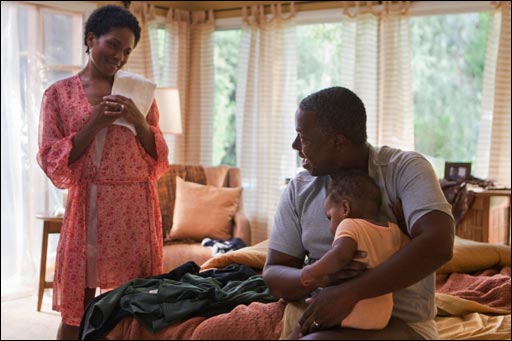 Andre Braugher:
Right, exactly. Well part of it yes, is swallowing my pride. But the
other thing is in the ongoing story of Owen’s maturation. Putting
the business first is important also. So yes, you have to swallow
your pride, if I want to play at this level. And if I want to be a
salesman and hold petty grudges, I could step back on the floor.
But, I think my father is asking me to step up and it’s hard. It’s a
different aspect of being a leader, a general manager, which has its
complications. Of course, this being a well-written show, nothing
goes right. But, it is an attempt on Owen’s part to grow up here.
Andre Braugher:
Right, exactly. Well part of it yes, is swallowing my pride. But the
other thing is in the ongoing story of Owen’s maturation. Putting
the business first is important also. So yes, you have to swallow
your pride, if I want to play at this level. And if I want to be a
salesman and hold petty grudges, I could step back on the floor.
But, I think my father is asking me to step up and it’s hard. It’s a
different aspect of being a leader, a general manager, which has its
complications. Of course, this being a well-written show, nothing
goes right. But, it is an attempt on Owen’s part to grow up here.
So is it an important step in his
maturing?
Andre Braugher:
It is. It is an important step.
I was
wondering if you still sing and if so, do you think your character
will be singing on the show?
Scott Bakula:
I do still sing. I still study voice. I've done a few musicals in
the last three or four years. I've been able to get out and have to
go and do that. That is kind of my first love. I don’t know that I
will sing on the show, my character certainly is an actor and we
talked about some musicals that I did when I was back in college.
So I have the possibility of doing that. There was a time when they
originally conceived Terry that my part time job was going to be as
a kind of a wedding singer. Which would have been a blast but they
went away from that. I hope that maybe we'll get a chance to sing.
There was a point in time when if we had gone long enough in
Enterprise, I would have been a singing starship captain but we
didn’t get that far.
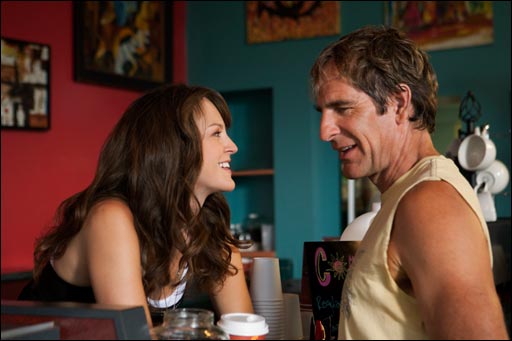 I really
enjoyed the first two episodes for the new season. Sort of in honor
of Terry's old frozen food commercial in the second episode, do you
have any early showbiz jobs that ever come back to haunt you?
I really
enjoyed the first two episodes for the new season. Sort of in honor
of Terry's old frozen food commercial in the second episode, do you
have any early showbiz jobs that ever come back to haunt you?
Scott Bakula:
(laughs) Well, I wouldn’t say that
they’ve come back to haunt me but I did a few commercials when I was
just starting out in New York. They were great because they paid
bills and gave me some financial freedom. But there were a few of
them that were… I had a big huge Canada Dry commercial that I did
with Bob Giraldi and Michael Peters when he was alive. It as right
after the “Thriller” video came out so I was a singing, dancing, guy
at the front of the triangle coming down dancing to Canada Dry
music. It's never come back to haunt me but it definitely makes me
smile.
And I want to
tell you that your old commercials are on YouTube, I just looked
them up.
Scott Bakula:
I'm sure that they are. I'm sure that they are. You can't get away
from anything anymore, really. I'm not sure that that’s necessarily
a good thing. Some things should be memories, but that is not the
world we live in anymore. So certainly, it's relevant that this
episode this idea of me having made a commercial twenty years ago
and having it come back to haunt me – in whatever way it works in
our show – is real. And maybe a little bit painful but those
commercials paid some bills.
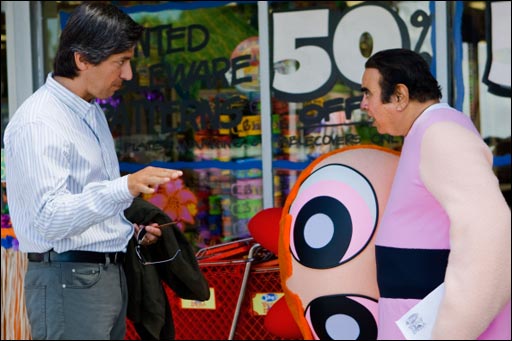 I wanted to know if anything
is done on the production to reduce its carbon footprint. Are there
any things that are done like as far as like waste reduction or
reusing-recycling bins? Because you are involved as a producer, so
you are in some way responsible. Does anything like that happen?
I wanted to know if anything
is done on the production to reduce its carbon footprint. Are there
any things that are done like as far as like waste reduction or
reusing-recycling bins? Because you are involved as a producer, so
you are in some way responsible. Does anything like that happen?
Ray Romano:
Yes. On the set, I'm trying to think what's going on on the set. I
know that in our offices, because I'm in my office everyday, we've
supplied every office with co-mingle recycling bins for our waste
and everything. So yes, we are very green conscious and we all drive
Priuses, myself and Mike Royce. And I get paid in apple seeds. But
no, we're doing our duty, we are very environmentally conscious. To
the best of our ability, we're pitching in.
What keeps challenging you about
playing Owen?
Andre Braugher:
Well like life, nothing ever goes right and that’s a beautiful
thing, because as I mentioned before, the struggle is fascinating.
Quite often I’ve played very assured characters, very competent
characters, and this was a departure from that and I think a welcome
one just in terms of broadening my ability to express myself in this
dimension. These relationships are really the most appealing part
about it, to play a character who has been married for 20 years and
still is crazy about his wife, with three kids and struggling to
make a living selling cars. It’s a challenge. The evolution, the
maturation of the Owen character is just appealing to me. Quite
often the characters I’ve played are ready-made atoms in their own
way. They don’t have a lot of context and they don’t have a lot of
history. But here is a character that is all context and all history
and it’s a welcome departure.
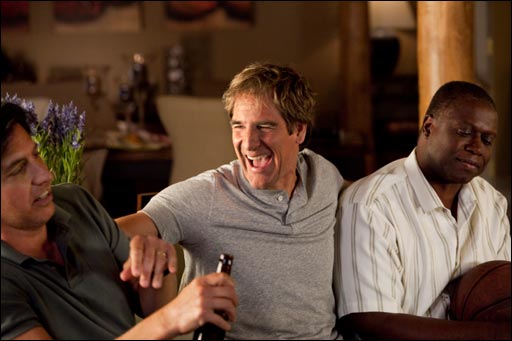 Why you think people continue to
tune in and watch Men
of a Certain Age?
Why you think people continue to
tune in and watch Men
of a Certain Age?
Andre Braugher:
Only because we’re telling stories that they find appealing in this
way. Truth telling is a very compelling and watchable experience.
When you find stories that tell the truth about your life, you find
them fascinating because it’s an affirmation that instead of being a
faceless drone or the stupid dad on television that you’re really
dealing with people with dimension. So consequently I think that’s
one of the reasons people enjoy tuning in.
Scott Bakula:
Well, I think the big catch with the show from the beginning was
because it is so different, whether people were actually going to
like it. That hasn’t changed and people embraced the show. We are
coming back with more and more of the same but obviously a brand new
season. Because there isn't a show like us on the air and Ray Romano
and Michael Royce's point of view is kind of unique. I think people
have responded to that.
There is a
great sense of reality that the show has. All three of our
characters are different and yet relatable. So many people have come
up to me. Men have come up and said “I see a little bit of myself in
all three of your guys’ characters.” That has made us popular. Lots
of women over the course of the last year have said, “when you threw
that coffee on that back of that car and chased after the car, my
husband would do that just like that” and you know the husbands are
kind of looking down at his toes. I think we are a relatable show.
We are not fancy but people seem to be comfortable with us.
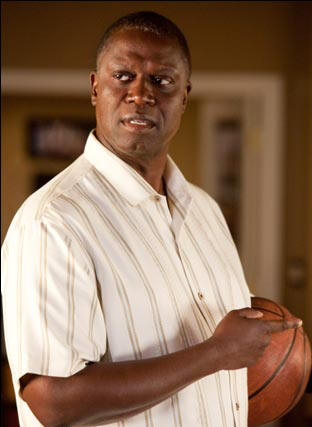 I guess this is another way of
asking too – reaction to the show from fans, have you gotten a lot
just in your being out in the world?
I guess this is another way of
asking too – reaction to the show from fans, have you gotten a lot
just in your being out in the world?
Andre Braugher:
Yes, people recognize me. It’s a self-selected audience of course.
People who hate the show don’t come up to me at all. People who like
the show come up and they express an appreciation for the fact that
we’re telling a story about older people who are typically invisible
on shows – or functionaries like the Chief of Police, or the doctor
who delivered the bad news or something to that effect. They’re
pleased that someone is telling a story that reveals people of a
certain age in all their dimensions.
What is your working process with
Mike Royce is like on this show, and how has that changed from when
you where working on
Raymond together?
Ray Romano:
Well on Raymond, he was one of the writers on the staff. Phil
Rosenthal kind of ran the writer's room and I was in there whenever
I wasn't on stage. And this, it's just me and him and you know, it's
kind of new for both of us running the show. Not only that – it's a
one-hour and it's a single camera. What made Raymond flow so
smoothly compared to other sitcoms – from what I hear – is we
started the season with scripts written, with about twelve scripts
fully written already. Phil made sure that we had that going, and
that made all the difference. That's what we tried to do here, Mike
and I. We started writing. We had a staff of only five writers, and
we met in March, and we weren't going to start filming till August.
We just beat out stories the room, and we got scripts written before
we started filming. It's still a crazy amount of work but it seems
to be manageable now.
I love the
fact that the guys are lifelong friends. They’ve been together for
all these years even though they are very different types. Did you
guys sort of get together and discuss the characters’ back story:
how they met and stayed together after all these years? Also do you
have any friends from childhood that you still see regularly?
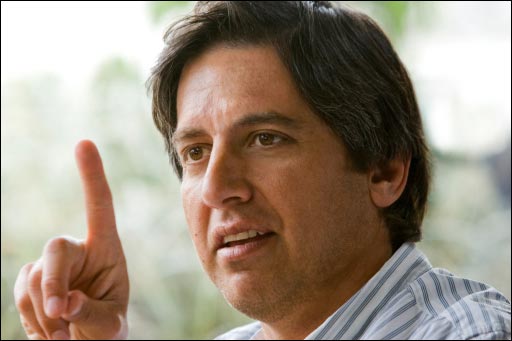 Andre Braugher:
I do have friends from childhood that I see regularly. I don’t think
we had formal conversations about exactly what the back story is. We
all went to Syracuse. According to the opening credits, we all got
in the car and drove to sunny California together. My character is
from California because my father is a former Laker star and an auto
dealer. In that way I am returning home. I don’t know exactly where
Terry’s character is from. He’s from the Midwest, that much we know.
His little brother is out here that essentially grew up without his
father. These are certain little facts that we know about these
characters. But we’ve never really sat down and said this is what
happened in 1984 and this is what happened in 1994. We didn’t do
that.
Andre Braugher:
I do have friends from childhood that I see regularly. I don’t think
we had formal conversations about exactly what the back story is. We
all went to Syracuse. According to the opening credits, we all got
in the car and drove to sunny California together. My character is
from California because my father is a former Laker star and an auto
dealer. In that way I am returning home. I don’t know exactly where
Terry’s character is from. He’s from the Midwest, that much we know.
His little brother is out here that essentially grew up without his
father. These are certain little facts that we know about these
characters. But we’ve never really sat down and said this is what
happened in 1984 and this is what happened in 1994. We didn’t do
that.
My mother sends her regards. She
is still obsessed with
Homicide and she wants to know when they will be redoing it with
you.
Andre Braugher:
I don’t think it will ever happen but please give her my regards.
It’s sort of tough for an actor
to get a role in a single multi-season series and obviously you had
Homicide and I was
also a big fan of Hack. How gratifying is it that you’re now
able to do it yet again?
Andre Braugher:
It’s good. It’s good. It helps put my kids through college, you know
what I’m saying. But the other thing about it is it’s sort of a role
that I’ve been waiting for, you know. So often in my career I have
played brilliant, authoritative, hyper competent characters.
Benjamin Gideon is a brilliant oncologist and researcher and Frank
Pembleton is a brilliant detective in a small town in Baltimore. But
when I look up with this role, I just found it really satisfying to
not be hyper competent and not be brilliant. In a certain way
explore the joy of Owen’s ordinariness. So I’m happy about getting
this job and I’m looking for the next challenge after the series
ends, you know, three, four, five years. I don’t know what it will
be. It’s really dependent on how the audiences feel about it. But
there will be another challenge somewhere along the line and really
looking forward to grabbing something new. I have learned a lot by
watching both Ray and Scott in terms of how to bring out the human
comedy. I’ve learned a lot about the art of storytelling by watching
these guys really craft and hone these shows – sometimes on their
feet while we’re doing them. A lot about the honesty and the
truthfulness and the bravery necessary to play comedy. This has been
a really satisfying experience. I don’t know how long it will last,
how long it will be a joy ride. As long as it lasts I’m going to try
to really glean all of the good stuff from it I possibly can.
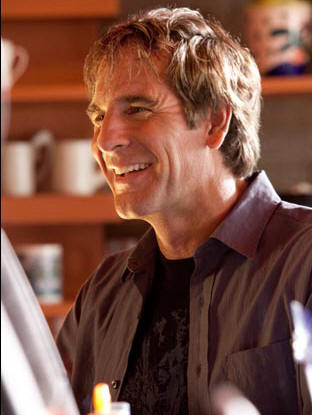 I am from
Israel. I have two questions about that and sorry I am a bit
nostalgic but because we didn’t have a lot of channels on TV here so
it was very meaningful for us to see you every day. So
I wanted to ask, do you know what your effect outside of the USA,
like people like me growing on the character of Sam Beckett and
also, do you miss him sometimes and do you think maybe you would
have wanted him to have more leaps these days?
I am from
Israel. I have two questions about that and sorry I am a bit
nostalgic but because we didn’t have a lot of channels on TV here so
it was very meaningful for us to see you every day. So
I wanted to ask, do you know what your effect outside of the USA,
like people like me growing on the character of Sam Beckett and
also, do you miss him sometimes and do you think maybe you would
have wanted him to have more leaps these days?
Scott Bakula:
Yes, thank you. Yes, I am very aware of the worldwide effect that
Quantum Leap has had. The few times I get out and do any kind
of convention or a fan gathering, people come from all over the
world and are fans. I'm always touched by that. For the people that
were involved in making the show, it really lands on you in terms of
the impact that you've had and the families that watched our show
together and how much of an impression we made. That is always a
great feeling.
And yes, we
would have loved for the show to have gone on longer. The continuing
popularity of the show – with younger people now and people that
grew up on it [that] are now sharing it with their kids – it really
makes you proud. It makes you realize that you did something that
not only had a lot of effect on people when it came out but still
has relevance and meaning in the world. Certainly, a character like
Sam Beckett – we could use a few more of him around. So I'm proud of
the show and I love to hear that you enjoyed it over there so much.
I hope it wasn’t just because you only had a few channels to watch.
What was your reaction to the
Emmy nomination?
Andre Braugher:
I was pleased without a doubt. But, like everybody else, when you’re
handicapping, you know, Aaron Paul was going to win it. So, I was
prepared and sure enough Aaron Paul won it so there we have it. But
I was pleased. It’s nice that people recognize the show. It’s nice
to be recognized for telling the kind of stories that are pleasing
to us and then amazingly are also pleasing to the audience. So
awards aside, the nomination is really a testament to the fact that
we’re on the right track.
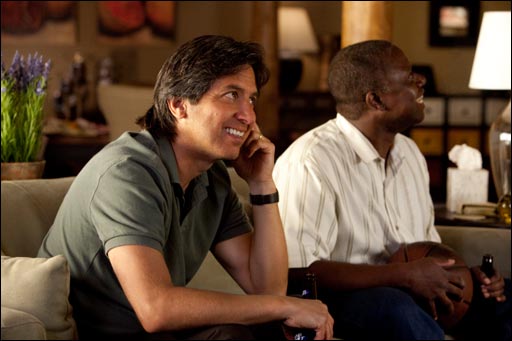 I started watching because you and
Scott Bakula were on but it’s such an amazing, well-written show and
has such great characters and probably because of my age I guess I
can relate. It’s not just men of a certain age: it’s people of a
certain age. I’m also Type 2 diabetic, I was going to ask you if
you think Owen will be having more issues, more problems with that
in the upcoming episodes.
I started watching because you and
Scott Bakula were on but it’s such an amazing, well-written show and
has such great characters and probably because of my age I guess I
can relate. It’s not just men of a certain age: it’s people of a
certain age. I’m also Type 2 diabetic, I was going to ask you if
you think Owen will be having more issues, more problems with that
in the upcoming episodes.
Andre Braugher:
I don’t think so. We had a whole episode about the intense
concentration on Owen and Owen’s eating disorder, the emotional side
to it. He made a vow to his kids about eating healthy and the
character has been eating healthy, so it looks as though there will
be an improvement. I mean, literally an improvement in his health
and his outlook. I don’t think his diabetes will become showcased as
a part of his character.
Were there things you learned
last season in this process with Mike that you adapted to for this
season?
Ray Romano:
Well, it worked last year, where we wanted to make sure we could do
that again, and we only had ten episodes last year. This year we
went to twelve episodes. And we were kind of sure we could handle
it. It's caught up to us a little bit now, because now we're filming
now and we’re in our tenth episode and we still have to write the
finale. It's kind of catching up with us. So if anything we're just
learning that it pays to be ahead of the game – when you've got to
rush the creativity process it never really comes out as good as you
want it. We're just learning to prepare. It's catching up with us a
little bit, but we're going to make it. If we had to do a
sixteen-episode season right now, we would be in trouble – which is
why we're not going to.
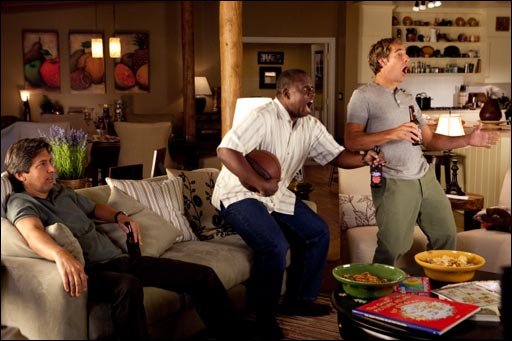 You mentioned
earlier and it is true that the show is very unique. I was
wondering why you think that there are so few shows out there around
the personal lives and problems of men in their 40s – or women in
their 40s, for that matter? Why is something like that is so unique
in today's television world?
You mentioned
earlier and it is true that the show is very unique. I was
wondering why you think that there are so few shows out there around
the personal lives and problems of men in their 40s – or women in
their 40s, for that matter? Why is something like that is so unique
in today's television world?
Scott Bakula:
Well, I think in today's television world, I don’t think this show –
to be quite honest – would have made it on the air if Ray hadn't
been attached to it. I think this is driven completely by the
presence of Ray Romano and his return to television. That's what
seriously got TNT excited. In the landscape of today's television,
most writers are going to be going and pitch a story like this and
then the network is going to say "Well do they fight crime together
when they're not at the diner talking?" "Do they own a strip club?"
Or "How can we jazz the show up?" Happily, because Ray and the
network's desire to be in business with him, he was able to let the
show be and let the show breathe. The network has been fantastic
with allowing the show to be human. It's just in the world today –
and advertising and marketing – people are used to flashier,
catchier, fancier, dressed up hours of television. So it just
doesn’t fit in. Then you can say, “well gosh look at Mad Men”
or look at whatever. It's very rare that you can get a show that is
about people. I have pit shows in my life where it's a relationship
show and they almost left you out of the room because they just
wanted to be about something. It needs to have a franchise. What is
the franchise? That is not what our show's about. This is just one
of those marriages where the material and the right guy brought it
to the right network. We are where we are because believe me, if
we'd done the show on a major network, it wouldn’t be the show that
you see right now. We're just lucky, I think. Nothing against guys
my own age and guys in their 40s but I think the concept in
television is that we are not that interesting unless we are solving
crimes or driving fast cars or flying Starships – as I have done. So
we just got lucky.
Email
us Let us know what you
think.